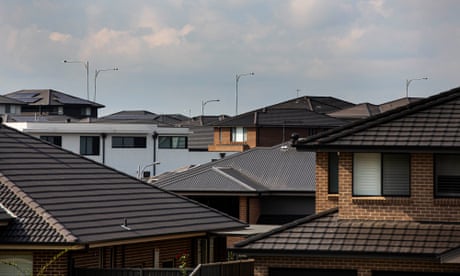- by foxnews
- 08 Apr 2025
Worried about rising interest rates? Here’s what experts suggest
Worried about rising interest rates? Here’s what experts suggest
- by theguardian
- 05 May 2022
- in news

Mortgage holders in Australia have this week faced the unwelcome but not completely unexpected news that they will be paying more, with the central bank lifting the official cash interest rate for the first time since 2010.
So what can borrowers do to ease mortgage pressure as interest rates climb?
Canstar's editor-at-large, Effie Zahos, said the Reserve Bank of Australia's decision on 3 May to raise interest rates from emergency lows to a new cash rate of 0.35% will translate to an increase of $88 each month on the average mortgage.
Under the new rate, the monthly payment on a $600,000 home loan would rise to $2,324, an increase of $74, the Finder.com.au comparison website states. For someone with a $1m loan, repayments would rise by $130 a month.
So the first thing borrowers can do is shop around to see which banks have the best interest rates on offer. Compare other lender offerings with your own mortgage and if you are not getting the best deal, take action.
"Talk to your lender first, see if they have cheaper alternatives," Zahos said.
New customers get better deals than existing customers, she said, so it could be time to look at refinancing your loan.
"We know new loans are [on average] at 2.49% interest and existing customers are at 2.92% - that's a difference of 0.43%," Zahos said.
"That's almost two rate hikes, so you can get yourself a buffer. The cheaper home loans will go up but you're coming from a low base."
Zahos said the next step is going through your own bills.
"It's going to be boring, it means you'll have to sit down, print out your statement and highlight everything recurring."
You need to look at everything from your home and contents insurance, to health insurance, energy bills, your internet plan, subscriptions and gym memberships.
"Ask yourself: 'Do I want it? Do I need it? And am I on the best possible plan?'" Zahos said. "Right now it doesn't pay to be average, you want to be better than average."
Look for either the cheapest or the one that gets you the best value.
The chief executive of Financial Counselling Australia, Fiona Guthrie, says the other important thing to do is to see what concessions you might qualify for.
"For instance, you might be entitled to electricity concession," Guthrie said.
"State governments have good concession finder websites, where you put the information into the site and it shows you what you're entitled to."
When announcing the decision to increase the cash rate from the record low 0.1%, the RBA signalled more rises to come, with governor Philip Lowe saying it was "not unreasonable" to expect interest rates to rise to 2.5%.
Zahos said it could be helpful to take some time now to check if a fixed or variable rate is better for you.
With fixed rates at 2% last year, many Australians already switched in expectation that rates would rise.
A fixed rate can offer certainty over two or three years, she said, but there were pros and cons, so doing your research was important.
"You may want to consider locking it in - the cheapest fixed rate on Canstar's database is 3.28%," Zahos said.
"You only need a couple of rate hikes to happen and you would be in a better situation at the end of this year."
Guthrie said the first thing you should do if you're struggling is talk to your bank.
"Definitely speak to your creditors and your bank. They have really improved after the last 10 years," Guthrie said.
They should be able to offer help - whether it's reducing your repayments, offering you lower interest or temporarily pausing your home loan. There are options available.
In some states, there are also mortgage relief schemes. You can look into these, and it's always good to call in professional help.
- by foxnews
- descember 09, 2016
Ancient settlement reveals remains of 1,800-year-old dog, baffling experts: 'Preserved quite well'
Archaeologists have recently unearthed the remarkably well-preserved remains of a dog from ancient Rome, shedding light on the widespread practice of ritual sacrifice in antiquity.
read more


